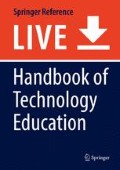Abstract
For most of the previous two centuries teaching has occurred with one teacher and 20–40 students in one classroom using a teacher-centered approach to teaching. Learning in this “classic” type class room focused on the predetermined learning of discipline-based facts, knowledge, and skills with some subsequent application in frequently contrived unfamiliar or outdated contexts. With the introduction of the twenty-first century, we are seeing a significant shift in teaching philosophy and approaches to learning. Teaching pedagogies and spaces need to become more flexible to facilitate a wider range of students’ interests and needs and include the development of skills and knowledge and dispositions vital for twenty-first century living such as: collaboration, cooperation, critical thinking, and problem solving skills, while at the same time ensuring “curriculum content” knowledge is not lost, but available to students when needed.
References
Bolstad, R., & Gilbert, J. (2008). Disciplining and drafting or 21st century learning? Rethinking the New Zealand senior secondary curriculum for the future.
Claxton, G., & Carr, M. (2010). A framework for teaching learning: The dynamics of disposition. Early Years: An International Journal, 24(1), 87–97.
Fox-Turnbull, W. (2003). The place of authentic technological practice and assessment in technology education (MTchLn Thesis for Master of Teaching and Learning), Christchurch College of Education, Christchurch.
Hennessy, S. (1993). Situated cognition and cognition apprenticeship: Implications for classroom learning. Studies in Science Education, 22, 1–41.
Snape, P., & Fox-Turnbull, W. (2011a). Perspectives of authenticity: Implementation in technology education. International Journal of Technology and Design Education (early access online).
Snape, P., & Fox-Turnbull, W. (2011b). Twenty-first century learning and technology education nexus. Problems of Education in the 21st Century, 34, 149–161.
Wagner, T. (2008). The global achievement gap: Why even our best schools don’t teach the new survival skills our children need- and what we can do about it. New York: Basic Books.
Author information
Authors and Affiliations
Corresponding author
Editor information
Editors and Affiliations
Section Editor information
Rights and permissions
Copyright information
© 2017 Springer International Publishing AG
About this entry
Cite this entry
Fox-Turnbull, W. (2017). Teaching and Learning in Technology: Section Introduction. In: de Vries, M. (eds) Handbook of Technology Education. Springer International Handbooks of Education. Springer, Cham. https://doi.org/10.1007/978-3-319-38889-2_71-1
Download citation
DOI: https://doi.org/10.1007/978-3-319-38889-2_71-1
Received:
Accepted:
Published:
Publisher Name: Springer, Cham
Print ISBN: 978-3-319-38889-2
Online ISBN: 978-3-319-38889-2
eBook Packages: Springer Reference EducationReference Module Humanities and Social SciencesReference Module Education

